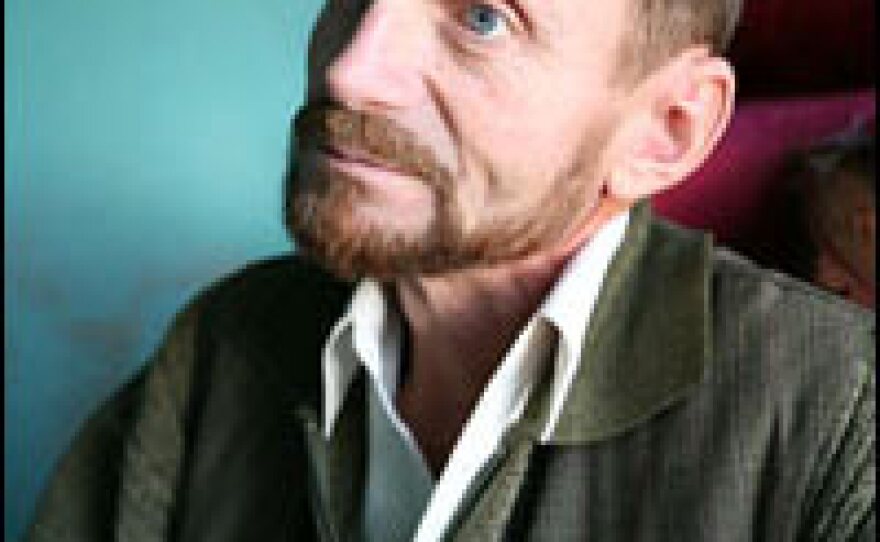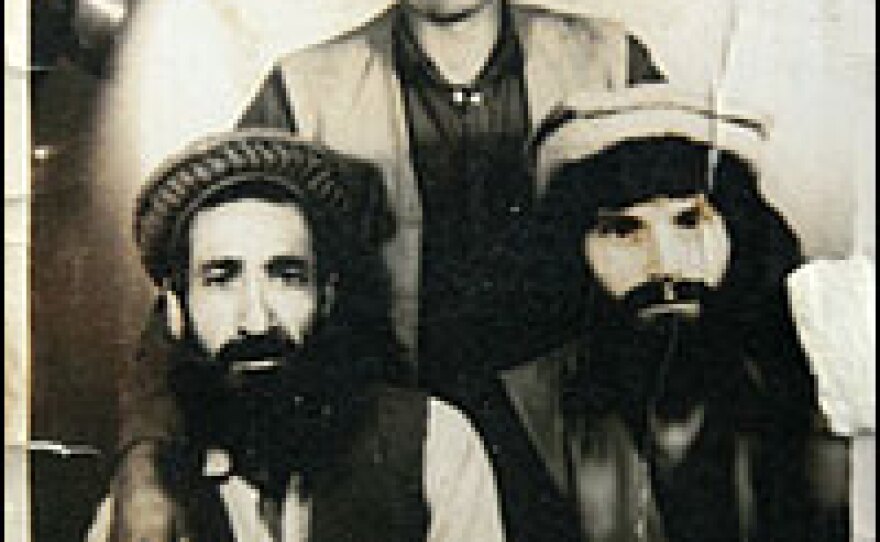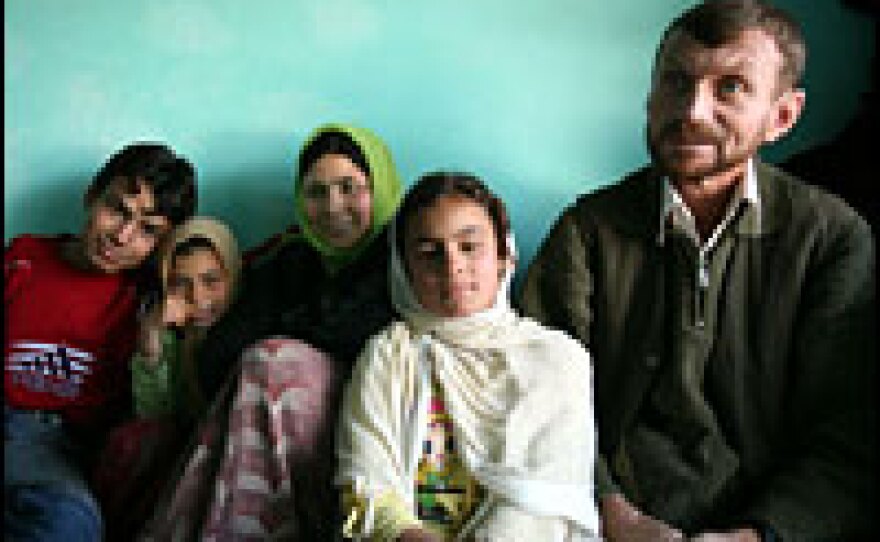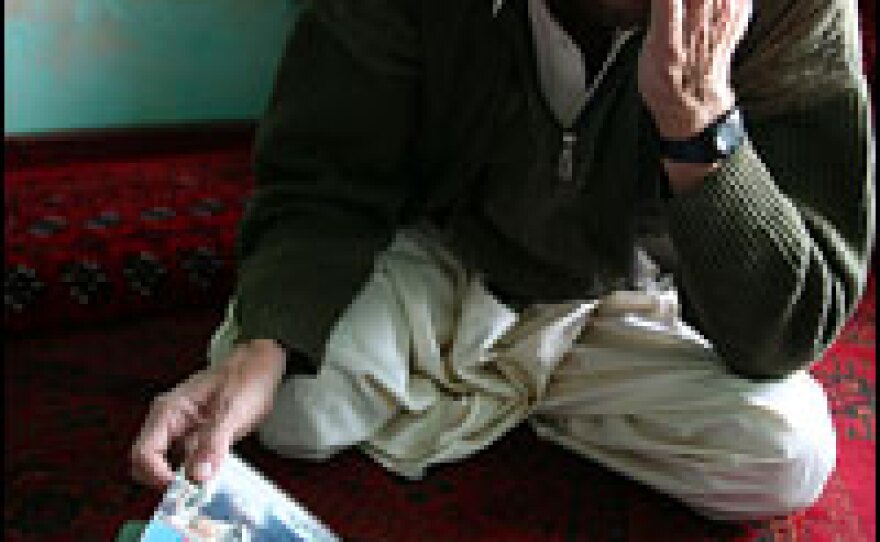



Afghanistan has been in a state of war for more then a quarter-century. It began when the Soviet Union invaded the country in 1979. More then a million Afghans were killed, as well as about 15,000 Soviet troops.
When the last Soviet general left Afghanistan in 1989, he famously said: "There is not a single Soviet soldier or officer left behind." But at least one Soviet soldier never went home.
Last month, a red-haired man with piercing blue eyes limped into the Kabul residence of a veteran British journalist named Peter Juvenal. Gennady Tseuma was dressed in the baggy shirt and trousers traditionally worn by Afghans, but he spoke fluent Russian.
Tseuma was born in what is now Ukraine. He first came to Afghanistan in 1983 as an 18-year-old conscript in the Soviet army. Less then a year later, mujahedeen fighters took him prisoner, and he has stayed in the country ever since.
The years in Afghanistan have been hard.
Though only 41, Tseuma's gaunt face looks 20 years older. Due to a mangled leg, he walks hunched over, with a severe limp.
'He's One of Us'
In the truck stops and dusty bazaars of northern Afghanistan, Afghans know Tseuma by his adopted afghan name Nik Mohammed. They treat him like a celebrity.
Tseuma earns about $100 a month working as a driver for an Afghan gem dealer. When he stopped to fill up his boss' car at a gas station in the city of Kunduz, locals invited him to sit barefoot on a carpet with them and drink tea.
"I've known Nik Mohammed for 20 years," says a gray-bearded Afghan putting an arm around Tseuma's thin shoulders. "He was with the mujahedeen — he's one of us."
In the privacy of Tseuma's humble, two-room house — which, in Afghan style, has no furniture, only cushions — the former Soviet soldier tells about the fateful morning 23 years ago when he wandered away from the bridge he was guarding and fell into the hands of Afghan rebels.
"They said, 'You have a choice. If you want to live, become a Muslim and stay here. If you don't, we'll kill you.' I agreed to cooperate."
Tseuma converted, dyed his hair and beard black, and lived for years in the mountains with the mujahedeen, at times dodging Soviet airstrikes.
Too Scared to Go Home
After the Soviets left, a mujahedeen commander "gave" Tseuma a young Afghan wife. He started working as a truck driver.
Juvenal first met Tseuma in 1991 and was one of the first Westerners to track him down. He said the former prisoner was shocked to see him.
"Don't forget the Berlin Wall had come down," Juvenal says. "We had to explain all these things to him. And I got the impression he did not believe us and it was all some sort of elaborate trick to get him to go back home, because the Soviet Union had a very bad reputation with prisoners of war who went home."
In 1992, shortly after the collapse of the Soviet Union, Tseuma met briefly with his father and a Russian government delegation at the Afghan border. He says they tried to persuade him to come home.
"My father explained everything to me, but I was still too scared. And I had a wife and baby son here. We couldn't travel then and my wife didn't want to leave. So I stayed here."
Tseuma now has four children with his wife Bibi Awaa. During the years of warfare in Afghanistan, they have at times become refugees, fleeing battlefields and nearly losing their eldest son in a rocket attack. In the meantime, Tseuma's father and mother, whom he never got to see again, both died in Ukraine.
Tseuma sometimes talks on the phone with his surviving younger brother Sergei, who lives in Ukraine. In one recent conversation, Gennady Tseuma promised Sergei that he would come home soon.
'I Want to See My Brother'
In a separate interview, Sergei says he longs to see his older brother. "Please help him come visit us in Ukraine for at least a month, just to show him how we are living here. I want to see my brother. I desperately want to see him."
In 2002, Ukrainian diplomats made arrangements to bring Gennady Tseuma home. But at the last minute, he backed out. He appears torn between the land of his birth, and the country that once imprisoned him.
Juvenal, the British journalist, has seen several Soviet prisoners of war return to their homeland. He says some became outcasts, because they could not handle the culture shock of moving back.
"They could never assimilate back in and they've been here too long," he says.
Meanwhile, Tseuma's health is deteriorating. The cold weather locks up the joints in his bad leg, leaving him unable to walk or work during the winter. His brother Sergei wants him to come to Ukraine for an operation, but neither brother has the money to pay for the trip, and the elder Gennady is still waiting for the Afghan government to issue him an Afghan passport.
But if the growing conflict between the Taliban and the government in Kabul gets worse, Tseuma says he won't wait any longer to leave.
"If the war starts again," he says, "then I'll immediately run away to Tajikistan... If they don't let me in, then I'll jump right into the river. There's a river there on the border with Tajikistan. There is no other option."
Copyright 2022 NPR. To see more, visit https://www.npr.org. 9(MDAzMjM2NDYzMDEyMzc1Njk5NjAxNzY3OQ001))






